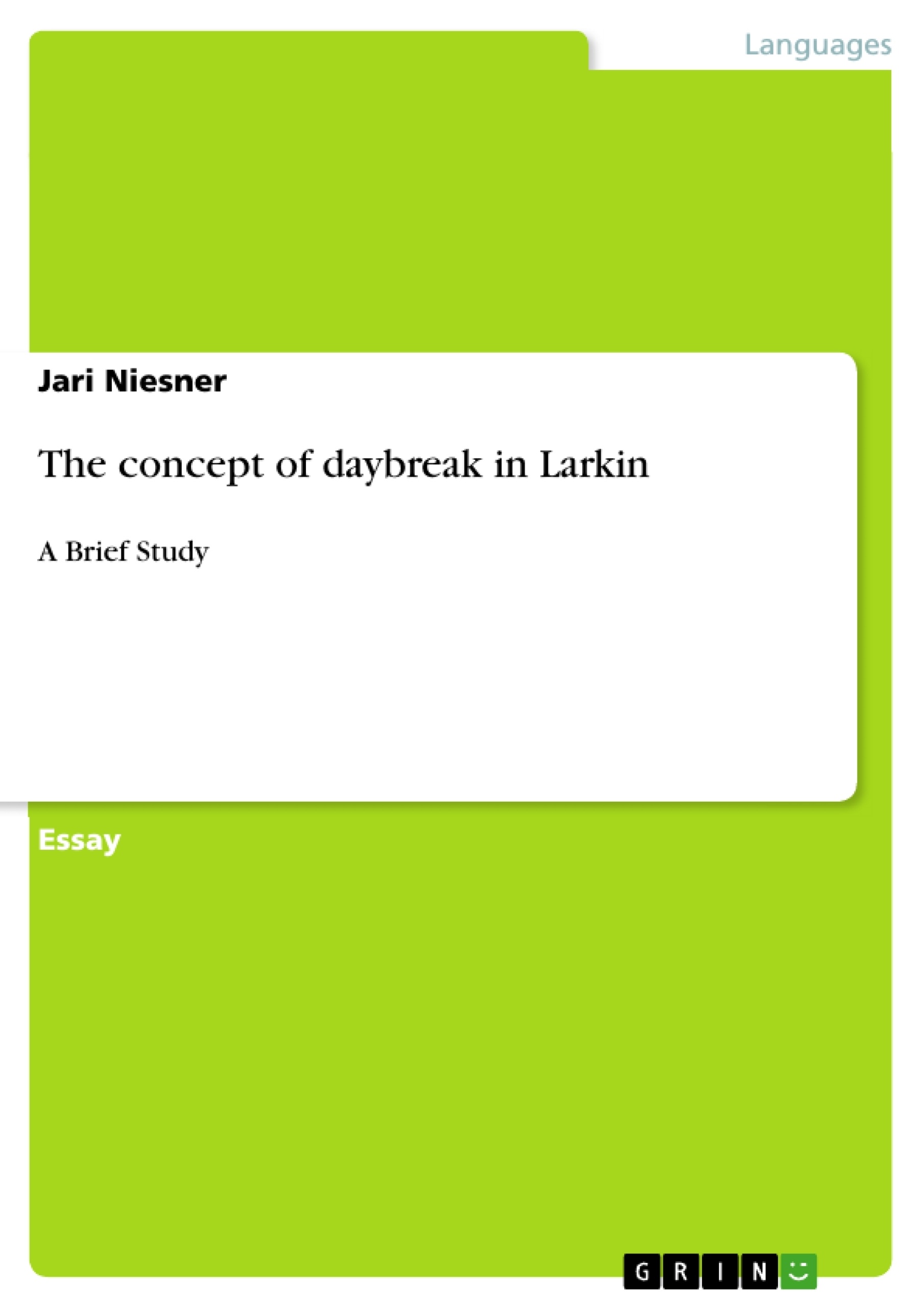Excerpt
Introduction
Philip Larkin, born in 1922, has been read under what are generally perceived as his major themes: death, fatalism and gloominess. However, throughout his life he had constantly been struggling with and reflecting on problems of sex, marriage, love, and living (cf. Motion, esp. 291). Publishing four volumes of poetry by the time of his decease in 1985, Larkin became known for his lucid and often sharp-witted verse as well as for being socially withdrawn, sometimes called “the Hermit of Hull” where he resided from 1955 onward. In this essay I will set out to explore the connection between shyness, indecisiveness, fear of death, and the aspiration to be an artist as linked to the concept of daybreak in Larkin, drawing mainly on his own writing. There will be two subsections, the first concentrating on his early writing, and the second mostly discussing one of his later and darker poems: “Aubade”.
Early treatment of dawn
The North Ship, Philip Larkin's initial collection of poetry, is full of allusions to sunrise, morning, and daybreak, including even one poem “Dawn” (one out of only seven in this collection with a title at all). Interestingly, a school magazine had already printed a short story called “Getting up in the Morning” five or six years earlier when Larkin was at the end of Third Form (Motion, 22). Though literarily rather unimpressive, it provides evidence for his fascination with light and for his slowly but steadily developing melancholy. Whereas “Getting up in the Morning” contains a complaint about having to work when the day begins, “Dawn” handles its subject more symbolically. The speaker finds his heart “cold” and “loveless” like the outside world itself is, which seems removed and “flying” away. Similarly, the seventh poem of The North Ship talks about “morning” and “dawn” as decked with “the coldest dew” and as “frail and unsure”. Likewise, there seems to be “no love”. If these two pieces are considered a revelation of the poet himself, they clearly link to his shyness. Larkin more than once claimed that “poems are about yourself” (RW, 49). His dreams of having success in either writing or life at first appear to be thwarted by “the horns of the morning”. Confronted with his shyness and slight stammer, they seem to be “hopeless / And keep[ing him] from sleeping”. However, this poem germinates a different conclusion: “the sky spreads”, “Earth [has] grown”. Unreal, Yeatsian (“unearthly”) and “silent” as it still is, his work begins to mature, or at least there is a flash of hope at the edge of its dawn.
The wish to go on is also a theme of “Nursery Tale” which features an intelligent pun. The first stanza comprises the story of a “horseman”, only to take the poet to the end that “failure [...] is the way of life” (Spurr, 63). Even “So[,] every journey [...] / Leads me [...] / To some new ambush, to some fresh mistake” (L12-14), even though every journey is bound to fail, he travels on nonetheless. This perseverance is reinforced by the repetition of the word “carrion”, becoming to mean “carry-on” as the verse closes, an insistent invisible voice urging not to give in despite the “weariness of daybreak” threatening his ambitions.
Another two works (“XVI” and “XVII”) show morning and day with a little hope of change and emotional abundance. Both poems connect “wind” to volition, stressing the speaker's eagerness for motion and his latent energy. In the poem “XVI”, after a somewhat usual and disappointing night, with love a mere “commerce”, the lyric persona is lying awake, expecting morning. He is at the same time waiting for the “voices of girls” and knowing that they are unattainable for him, dressed in “scarves around their heads”. He seems to strongly resent that life is not going in the desired direction. Yet there is a sense of possibility, if also of dissatisfactory familiarity. A more positive emotional effect is created in “XVII” which foreshadows Larkin's career as a poet haunted by death. In his self-prediction he “must visit the dead” in order “to write one song[,] sad as the sad wind”. What he had not predicted was the golden shine of the view of morning, its noise, its endless possibilities. He had not predicted 'life'.
In “XXII” this interlocking of poetic ambition and life and their opposition is perhaps most explicitly displayed. Again there is somebody waiting, again there is the activity of wind (as in the two poems before). The man “restlessly” moving about the “deserted platform” is Larkin aspiring to be a poet. He seeks to explain to himself the origin of his ambition that will surely come to uneasy travelling through life, facing “a darkening autumn” already at its “dawn”. However, the last line discloses that the embrace of lovers, wife, and child is the silence of a “sink[ing] grave”. Looming behind his early verse was Larkin's idea that “what will survive of us is art“ as W. Graham once summed it up altering a line from his “An Arundel Tomb” (Spurr, 71).
The following poem (“XXIII”) makes clear his choice and repeats the knowledge that a “free [...] heart” “still end[s] in loss”. He chooses art because it contains the possibility of survival throughout time. In “Morning has spread again”, to the contrary, he wonders whether love should not be given a second chance, having barely been tried an insufficient number of times. Here especially, the sight of “the red east expanding” arouses his “sense of life lived according to love” (CP, 86, Faith Healing).
[...]
- Quote paper
- B.A. Jari Niesner (Author), 2014, The concept of daybreak in Larkin, Munich, GRIN Verlag, https://www.grin.com/document/279060
Publish now - it's free






















Comments